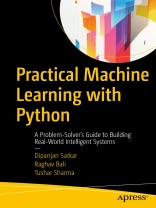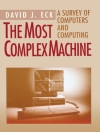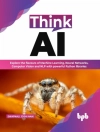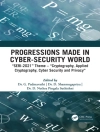Master the essential skills needed to recognize and solve complex problems with machine learning and deep learning. Using real-world examples that leverage the popular Python machine learning ecosystem, this book is your perfect companion for learning the art and science of machine learning to become a successful practitioner. The concepts, techniques, tools, frameworks, and methodologies used in this book will teach you how to think, design, build, and execute machine learning systems and projects successfully.
Practical Machine Learning with Python follows a structured and comprehensive three-tiered approach packed with hands-on examples and code.
Part 1 focuses on understanding machine learning concepts and tools. This includes machine learning basics with a broad overview of algorithms, techniques, concepts and applications, followed by a tour of the entire Python machine learning ecosystem. Brief guides for useful machine learning tools, libraries andframeworks are also covered.
Part 2 details standard machine learning pipelines, with an emphasis on data processing analysis, feature engineering, and modeling. You will learn how to process, wrangle, summarize and visualize data in its various forms. Feature engineering and selection methodologies will be covered in detail with real-world datasets followed by model building, tuning, interpretation and deployment.
Part 3 explores multiple real-world case studies spanning diverse domains and industries like retail, transportation, movies, music, marketing, computer vision and finance. For each case study, you will learn the application of various machine learning techniques and methods. The hands-on examples will help you become familiar with state-of-the-art machine learning tools and techniques and understand what algorithms are best suited for any problem.
Practical Machine Learning with Python will empower you to start solving your own problems with machine learning today!
What You’ll Learn
- Execute end-to-end machine learning projects and systems
- Implement hands-on examples with industry standard, open source, robust machine learning tools and frameworks
- Review case studies depicting applications of machine learning and deep learning on diverse domains and industries
- Apply a wide range of machine learning models including regression, classification, and clustering.
- Understand and apply the latest models and methodologies from deep learning including CNNs, RNNs, LSTMs and transfer learning.
Who This Book Is For
IT professionals, analysts, developers, data scientists, engineers, graduate students
قائمة المحتويات
Chapter 1: Machine Learning Basics.- Chapter 2: The Python Machine Learning Ecosystem.- Chapter 3: Processing, Wrangling and Visualizing Data.-Chapter 4: Feature Engineering and Selection.- Chapter 5: Building, Tuning and Deploying Models.-Chapter 6: Analyzing Bike Sharing Trends.- Chapter 7: Analyzing Movie Reviews Sentiment.- Chapter 8: Customer Segmentation and Effective Cross Selling.- Chapter 9: Analyzing Wine Types and Quality.- Chapter 10: Analyzing Music Trends and Recommendations.- Chapter 11: Forecasting Stock and Commodity Prices.- Chapter 12: Deep Learning for Computer Vision.
عن المؤلف
Dipanjan Sarkar is a Data Scientist at Intel, on a mission to make the world more connected and productive. He primarily works on data science, analytics, business intelligence, application development, and building large-scale intelligent systems. He holds a master of technology degree in Information Technology with specializations in Data Science and Software Engineering from the International Institute of Information Technology, Bangalore. He is also an avid supporter of self-learning, especially Massive Open Online Courses and also holds a Data Science Specialization from Johns Hopkins University on Coursera.
Dipanjan has been an analytics practitioner for several years, specializing in statistical, predictive, and text analytics. Having a passion for data science and education, he is a Data Science Mentor at Springboard, helping people up-skill on areas like Data Science and Machine Learning. Dipanjan has also authoredseveral books on R, Python, Machine Learning and Analytics, including
Text Analytics with Python, Apress 2016. Besides this, he occasionally reviews technical books and acts as a course beta tester for Coursera. Dipanjan’s interests include learning about new technology, financial markets, disruptive start-ups, data science and more recently, artificial intelligence and deep learning.
Raghav Bali has a master’s degree (gold medalist) in Information Technology from International Institute of Information Technology, Bangalore. He is a Data Scientist at Intel, where he works on analytics, business intelligence, and application development to develop scalable machine learning-based solutions. He has also worked as an analyst and developer in domains such as ERP, finance, and BI with some of the leading organizations in the world.
Raghav is a technology enthusiast who loves reading and playing around with new gadgets and technologies. He has also authored several books on R, Machine Learning and Analytics. He is a shutterbug, capturing moments when he isn’t busy solving problems.
Tushar Sharma has a master’s degree from International Institute of Information Technology, Bangalore. He works as a Data Scientist with Intel. His work involves developing analytical solutions at scale using enormous volumes of infrastructure data. In his previous role, he has worked in the financial domain developing scalable machine learning solutions for major financial organizations. He is proficient in Python, R and Big Data frameworks like Spark and Hadoop.
Apart from work Tushar enjoys watching movies, playing badminton and is an avid reader. He has also authored a book on R and social media analytics.












